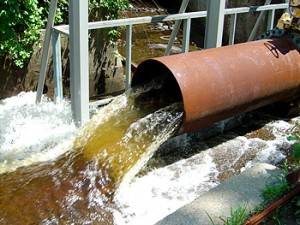Wastewater averaging… ah, a favorite topic of any cocktail party! What is that… you’ve never heard of wastewater averaging? Well, sit right back and let me tell how you can hack your wastewater averaging period and save money the rest of the year.
What is wastewater averaging?
Wastewater averaging is the practice of estimating the amount of wastewater discharged from your home into the city’s sanitary sewer system. It is essentially a cap on the volume of wastewater you will be billed for each month for the next year. This practice goes by a variety of names including average winter consumption, wastewater winter averaging, winter averaging, winter quarterly average, or winter period average.
Check with your local utility company to see how they handle your wastewater charges. Some utilities don’t want to mess with all these calculations, so they charge a flat, monthly wastewater fee.
Your water utility uses a wastewater average because they can’t measure the actual amount of wastewater discharged from your home. Potable water coming into your house is measured with a water meter since the water is pressurized, but wastewater flows out of your home by gravity. It is not easy to measure gravity water flow through a pipe. Therefore, the next best way to measure the wastewater discharge is to use your water meter to measure your monthly water use and then estimate the amount of wastewater that could be returning to the city sewers.
Shouldn’t water flow IN be equal to water flow OUT?
Well, in the winter time, it generally does, but during the rest of the year, it doesn’t since you could be using water outdoors. The water you sprinkle on your lawn doesn’t go to the city sewers. Therefore, the wastewater averaging period typically happens during the winter months when there should be little to no outdoor water use.
Typically, a multiple month average during the late fall and winter months is used rather than picking one month during the year. This averaging is more fair just in case you have a higher water use during a single month. For example, the City of Austin uses the water use from 3 consecutive monthly billing cycles between mid-November to mid-March. From these 3 months, the City of Austin will average the water meter readings and this will become the monthly wastewater charge for all of the other months during the year. If you use more water than your wastewater average, then it is assumed that this additional water has been used outdoors and will not be returned back to the city’s sewers for processing and treatment. Therefore, you are not charged for this water usage on your wastewater bill. Conversely, if you use less water during a month than your wastewater average, then your wastewater charge should equal only the actual amount of water used that month.
Why is this so important?
Generally, the cost of wastewater is higher than the cost of potable water. Due to the nature of wastewater, you can imagine it would be more expensive to treat before being released back into environment. Currently, the City of Austin charges $1.17 per 1000 gallons of potable water used in the 0 to 2000 gallon cohort while they charge $3.79 per 1000 gallons of wastewater used in the 0 to 2000 gallon cohort. For citizens of Austin this means that they can actually get 3 times more savings by conserving wastewater than they do by conserving potable water. In order to achieve these savings throughout the year though, you have to reduce your water use during your wastewater averaging period.
Conserving water in the winter = Saving money all year long
Using less water during the wastewater averaging period will result in a corresponding lower wastewater bill throughout the entire year. Here are ten ways to reduce your winter time water use and consequently your monthly wastewater bill:
1. Conserve water in traditional ways – I don’t want to go into all the typical water conservation tips and habits here but you should definitely stick to them. You can find many lists of ways to conserve water online.
2. Fix all leaky fixtures – This one is a mundane tip but leaks are a major culprit of unintentional water use in our homes.
3. Shower at your gym – Not only will this conserve water at your home but it could also get your New Year’s resolution to lose weight started early.
4. Use your workplace bathroom to do your business – Pretty self-explanatory. Less flushes at home, less water used!! You can also practice, “If it’s yellow, let it mellow, if it’s brown, flush it down.” to flush less.
5. Launder your clothes at a laundromat rather than at your house – You can also wash your clothes less or wear them multiple times before laundering.
6. Don’t wash your car at home – This one is easy.
7. Turn off your irrigation system – Your landscaping probably won’t need water during the winter months since the plants will be dormant.
8. Insulate hot water pipes – Since the cold weather is coming, this is a perfect time to insulate any exposed hot water pipes for more immediate hot water at the faucet. You’ll save some energy as well.
9. Don’t host a party or have family stay over the holidays – This one may be tough but you can see how hosting a lot of people at your house during the holidays could spike your water usage. This is a perfect time to say this – “Don’t be a Scrooge” though just to save a few dollars!
10. Don’t move into a new house at the early part of the year – You could get straddled with the previous homeowner’s high water usage. Saving money from wastewater has to be high on your priority list to make this tip useful but I wanted to throw it out there. In addition, this could work both ways. If the previous homeowner was water conservative and you’re a water hog, then you could be saving money due to reduced monthly wastewater charges versus the actual amount of water you use.
But this is cheating the system…
Some people may consider these tips as cheating the system, but many water utilities, including Austin, Texas, actively advertise their wastewater averaging period and ways for you to conserve water during this time in order to save money throughout the year. If the casino is losing money on a game, they wouldn’t be advertising it, right?
There you have it. Practice these tips and I guarantee you will reap savings throughout the year. If you have any other water conservation “hacking” tips, please comment below.




